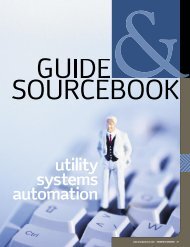asset management
asset management
asset management
You also want an ePaper? Increase the reach of your titles
YUMPU automatically turns print PDFs into web optimized ePapers that Google loves.
[ C A S E S T U D Y ]<br />
Mobile Computing Tools For Mobile Workers Improve<br />
Is the utility industry undergoing a sea change? Most analysts agree<br />
that it is not. They say, in fact, that it has already happened. The past<br />
model for increasing utility company profits — raising rates — is obsolete.<br />
New economic realities compel savvy executives to focus on bottom<br />
line improvements to increase market share, improve employee<br />
efficiency, maximize customer-retention levels and cut costs.<br />
And, they say, the 21st century’s emphasis on enterprise and productivity<br />
offers utility companies opportunities unseen since the early days<br />
of state and federal regulation three- quarters of a century ago. These<br />
opportunities more than justify the challenges inherent in seizing them.<br />
As one recently retired marketing vice president put it, “When<br />
I started in the business our major sales efforts were directed at<br />
legislators. When I left, it was all about customers. Which is how it<br />
should be. The legislators made sure we never lost money, but they<br />
also limited what we could do to earn income and how much of that<br />
revenue we could retain. Utilities are a no-limits industry now. A guy<br />
starting out in my business today may wind up building something<br />
more profitable than Microsoft by the time he steps down.”<br />
Exploiting new worlds — unlimited worlds — requires new tools. Better<br />
tools. Faster tools. More fail-safe tools. Tools that will work anywhere,<br />
anytime, under any conditions. Tools with an almost infinite capacity to<br />
be scaled up to do more work and scaled out to perform new tasks.<br />
Next-generation, utility task-optimized rugged portable computers,<br />
such as the Panasonic Toughbook® CF-18 and CF-29,<br />
are prime examples of tools that generate a direct impact on a utility<br />
company’s bottom line. This positive impact is measurable and<br />
occurs on both the revenue and cost sides of the balance sheet.<br />
A typical case study proves that the deployment of cuttingedge<br />
mobile-computing technology not only improves the bottom<br />
line, it improves it dramatically. And, in some cases, such as that<br />
of the United Kingdom’s largest power supplier, British Gas, the<br />
word “dramatically” could fairly be called an understatement.<br />
Prior to digitalization, British Gas had hundreds of field offices<br />
and 17,000 tech and back-office workers, most of them spending<br />
their workday shuffling papers. Today that 17,000-person workforce<br />
numbers less than 4,000, and most of the field offices have been<br />
shuttered.<br />
Wireless-capable Panasonic CF-18 ruggedized “convertible”<br />
notebook/tablets help a field force handle over 6 million service<br />
calls a year. Errors in ordering replacement parts have been<br />
reduced from one-in-four to “practically nonexistent” and delivery<br />
of those parts takes 12 hours, not several days.<br />
According to British Gas, the productivity of their technicians<br />
using the CF-18 has more than doubled, going from an average<br />
of four calls per day to ten and resulting in a “huge reduction in<br />
infrastructure and labor costs.”<br />
48 ENERGYBIZ MAGAZINE July/August 2005<br />
The British Gas experience proves that ruggedized computers<br />
with multi-protocol wireless connectivity are an essential component<br />
in reducing utility company operating expenses on both a global and<br />
per-call level.<br />
But can that impact really be shown on the other side of the<br />
ledger? Can a piece of hardware such as a Toughbook actually<br />
increase revenue as well as reduce costs?<br />
Research shows that it can, but only if that new piece of hardware<br />
fits perfectly within the IT scheme of the company deploying<br />
it. It must be more than the correct tool for the job; it must be the<br />
right tool for the entire enterprise.<br />
After intensive study and stringent testing, British Gas decided<br />
on the CF-18 because it exceeded both the performance and<br />
durability specifications for generic field-force computers and the<br />
task-specific requirements of a huge, diversified power utility.<br />
In addition to being the United Kingdom’s largest industrial and<br />
consumer supplier of gas and electricity, British Gas engages in<br />
such varied enterprises as appliance sales and repair, financial<br />
services, and security system design and implementation.<br />
The company employs field technicians for such disparate<br />
tasks as meter reading, line and pipeline maintenance, central air<br />
and heating system installation, commercial and residential steamboiler<br />
repair, and kitchen appliance service.<br />
To equip such a diverse workforce without hobbling the<br />
IT department with a hard-to maintain assortment of differing<br />
computer models and platforms, British Gas needed a high-performance,<br />
standardized unit with exemplary multitasking and communications<br />
ability.<br />
A fully ruggedized 4.5-pound computer with extended battery<br />
life, a 40GB shock-mounted hard drive and a daylight-readable,<br />
pressure sensitive touchscreen, the CF-18 instantly converts from<br />
a high-performance Windows XP notebook to a Windows XP tablet<br />
computer via a unique swiveling and folding screen.<br />
The Toughbook’s ability to replace both outdated notebooks<br />
and traditional, proprietary-software-driven pen tablets was<br />
critically important to British Gas, as was the CF-18’s full Intel®<br />
Centrino compliance and simultaneous wireless WAN, wireless<br />
LAN, Bluetooth and GPS capability.<br />
The time, effort and expense British Gas invested in its quest to<br />
maximize the return on its field-force computerization investment<br />
has paid off handsomely. Not only have the ruggedized portables<br />
dramatically reduced the sales, general and administrative share<br />
of every dollar British Gas spends on field force labor and materials,<br />
they have produced measurable revenue gains in areas susceptible<br />
to competitive pressures.<br />
According to British Gas Home Services IT business manager,<br />
Peter Ransom, the Panasonic “convertibles” are providing “absolutely<br />
fantastic” service. “Mobile computing has helped us reduce<br />
response times to call-outs, increase the speed of job turnaround,<br />
and ... present a fresh, clean and very professional image to the<br />
customer,” Ransom said.<br />
A D V E R T I S E M E N T



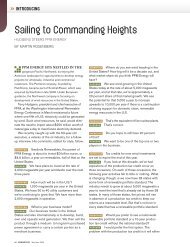
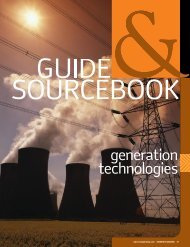
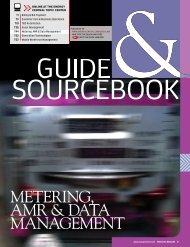

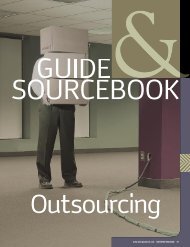


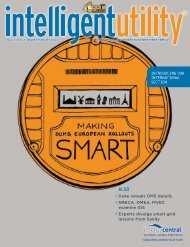
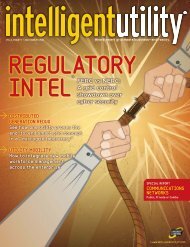




![View From the Trenches [PDF]](https://img.yumpu.com/18854438/1/190x252/view-from-the-trenches-pdf.jpg?quality=85)
